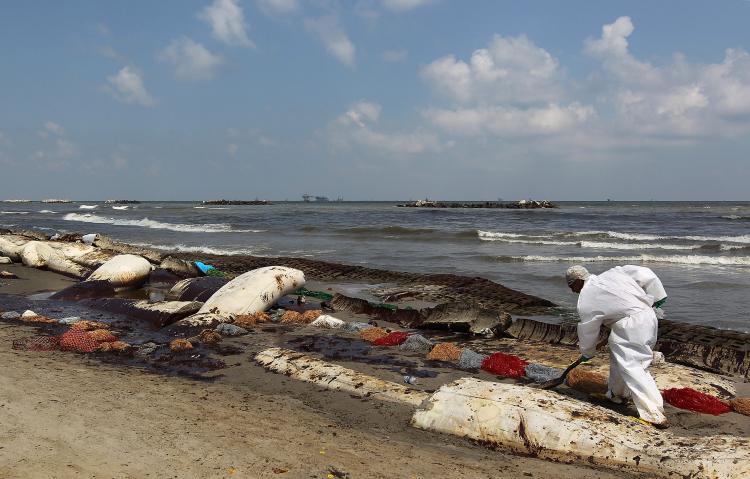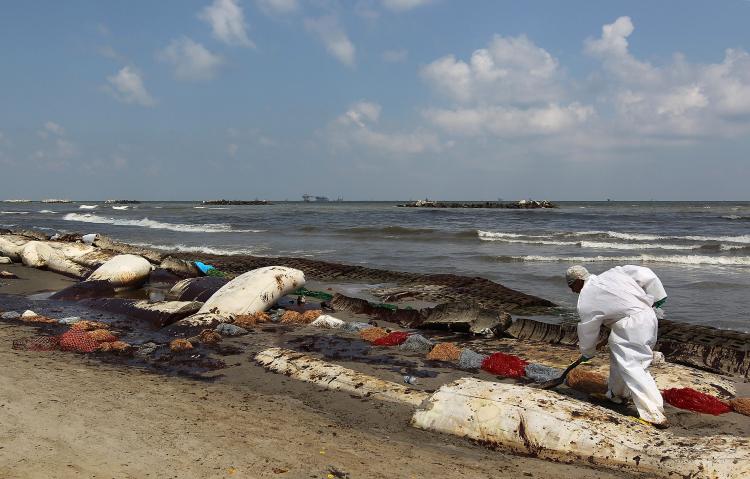The Citizens for Responsibility and Ethics in Washington (CREW) and Greenpeace demanded more footage and documents from BP to assess the true situation of the oil spill.
Under the Freedom of Information Act (FOIA), CREW and Greenpeace requested the necessary information from the Environmental Protection Agency (EPA), U.S. Coast Guard, National Oceanic and Atmospheric Administration, and the U.S. Department of the Interior.
“It is impossible to understand why the government hasn’t already made the video feed and other records documenting the impact of the spill public,” said CREW Executive Director Melaine Sloan in a CREW news letter.
“While we hope for prompt and complete responses to our requests, if the government resists or delays producing this critical information, CREW and Greenpeace are prepared to aggressively pursue this matter in court,” Sloan said.
In particular, CREW and Greenpeace want the four agencies to provide all documents regarding the use of dispersants and all of BP’s video footage that relate to the oil spill.
The impact on ocean life in the Mexican Gulf is seen on the shores in the form of dead marine life—coastal vegetation and birds coated in red viscous liquid.
Yet despite BP’s current efforts to provide transparency, their actions sink back to murky waters. The oil company plans to terminate their live video feed of the leaking oil on the ocean floor by Wednesday morning. It will stay shut down until BP’s attempt to close the well, with its new “top kill” plan, is done.
Congressman Ed Markey (D-Mass.) was hosting the video on his website. There are multiple video feeds, but only one was made public. Markey said on his website, “It is outrageous that BP would kill the video feed for the top kill. This BP blackout will obscure a vital moment in this disaster, After more than a month of spewing oil into the Gulf of Mexico, BP is essentially saying to the American people the solution will not be televised.” The Massachusetts Democrat is chairman of the Select Committee on Energy Independence and Global Warming and the Energy and Environment Subcommittee in the Energy and Commerce Committee.
Now that the only window into BP’s oil spill will be closed, Americans will be left in the dark to ponder what really takes place at the bottom of the ocean. For now, no one knows how much of the oil is spreading underwater or how much of an impact the Gulf is sustaining.
It is known that four years ago BP was about to be fined over $672 million over felony charges for knowingly ignoring the hazardous state of transit lines in the North Slope, Alaska. According to Scott West, a retired EPA investigator who spoke with “Democracy Now” on May 20, a pipeline ruptured, causing 250,000 gallons of oil to spill into a frozen lake in the tundra.
At the time, West was leading a criminal investigation of BP’s accident in the North Slope.
“It was a corporate culture that rewarded cost savings at every level, and that dealt harshly with anyone who brought bad news to management,” West said. He was discussing the findings of the 2006 criminal investigation of BP, in a Sea Shepherd newsletter. He said “BP is known by its workers to be extremely retaliatory.”
The company reached a settlement with the Department of Justice during the Bush administration and emerged with a fine of $20 million for “corporate misdemeanor,” West said on “Democracy Now.”
“I do not believe any lessons were learned at BP because of the fact that our government did nothing more than slap BP on its wrist in the previous cases,” West wrote in a Sea Shepherd news letter.
It did not surprise West that the oil rig in the Gulf of Mexico exploded on April 20.
Under the Freedom of Information Act (FOIA), CREW and Greenpeace requested the necessary information from the Environmental Protection Agency (EPA), U.S. Coast Guard, National Oceanic and Atmospheric Administration, and the U.S. Department of the Interior.
“It is impossible to understand why the government hasn’t already made the video feed and other records documenting the impact of the spill public,” said CREW Executive Director Melaine Sloan in a CREW news letter.
“While we hope for prompt and complete responses to our requests, if the government resists or delays producing this critical information, CREW and Greenpeace are prepared to aggressively pursue this matter in court,” Sloan said.
In particular, CREW and Greenpeace want the four agencies to provide all documents regarding the use of dispersants and all of BP’s video footage that relate to the oil spill.
The impact on ocean life in the Mexican Gulf is seen on the shores in the form of dead marine life—coastal vegetation and birds coated in red viscous liquid.
Yet despite BP’s current efforts to provide transparency, their actions sink back to murky waters. The oil company plans to terminate their live video feed of the leaking oil on the ocean floor by Wednesday morning. It will stay shut down until BP’s attempt to close the well, with its new “top kill” plan, is done.
Congressman Ed Markey (D-Mass.) was hosting the video on his website. There are multiple video feeds, but only one was made public. Markey said on his website, “It is outrageous that BP would kill the video feed for the top kill. This BP blackout will obscure a vital moment in this disaster, After more than a month of spewing oil into the Gulf of Mexico, BP is essentially saying to the American people the solution will not be televised.” The Massachusetts Democrat is chairman of the Select Committee on Energy Independence and Global Warming and the Energy and Environment Subcommittee in the Energy and Commerce Committee.
Now that the only window into BP’s oil spill will be closed, Americans will be left in the dark to ponder what really takes place at the bottom of the ocean. For now, no one knows how much of the oil is spreading underwater or how much of an impact the Gulf is sustaining.
It is known that four years ago BP was about to be fined over $672 million over felony charges for knowingly ignoring the hazardous state of transit lines in the North Slope, Alaska. According to Scott West, a retired EPA investigator who spoke with “Democracy Now” on May 20, a pipeline ruptured, causing 250,000 gallons of oil to spill into a frozen lake in the tundra.
At the time, West was leading a criminal investigation of BP’s accident in the North Slope.
“It was a corporate culture that rewarded cost savings at every level, and that dealt harshly with anyone who brought bad news to management,” West said. He was discussing the findings of the 2006 criminal investigation of BP, in a Sea Shepherd newsletter. He said “BP is known by its workers to be extremely retaliatory.”
The company reached a settlement with the Department of Justice during the Bush administration and emerged with a fine of $20 million for “corporate misdemeanor,” West said on “Democracy Now.”
“I do not believe any lessons were learned at BP because of the fact that our government did nothing more than slap BP on its wrist in the previous cases,” West wrote in a Sea Shepherd news letter.
It did not surprise West that the oil rig in the Gulf of Mexico exploded on April 20.



